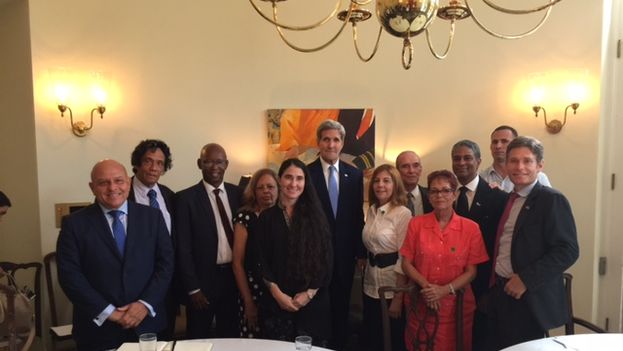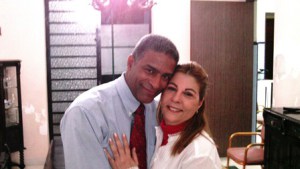
![]() 14ymedio, Reinaldo Escobar, 15 August 2015 — Six hours after the hoisting of the Stars and Stripes at the US embassy along the Malecon, a similar ceremony occurred on 150th Street in the Cubanacan neighborhood where the official residence of Jeffrey DeLaurentis, charge d’affaires of that country, is located.
14ymedio, Reinaldo Escobar, 15 August 2015 — Six hours after the hoisting of the Stars and Stripes at the US embassy along the Malecon, a similar ceremony occurred on 150th Street in the Cubanacan neighborhood where the official residence of Jeffrey DeLaurentis, charge d’affaires of that country, is located.
All of the heads of the United States Interest Section have lived in this mansion in recent years, and there is a flagpole in its garden. Across from it, congregated hundreds of guests who did not physically fit in the small space where hours earlier American and Cuban officials had witnessed the symbolic act that opened the US embassy in Havana. continue reading
The celebration at the residence was attended by diplomats, representatives of civil society, clergy, intellectuals and Cuban artists along with the large delegation that accompanied John Kerry in his trip to Cuba, including the three Marines who, 54 years ago, lowered the flag when the countries broke off relations, who given the honor of participating in the raising. The US Army Brass Quintet played an international repertoire, with no shortage Cuban pieces such as Guantanamera and Manisero.
In a half-hour meeting, representatives of civil society shared with Kerry their concerns and expectations
In the official residence John Kerry held a half-hour meeting behind closed doors with representatives of civil society activists and independent journalists, including Dagoberto Valdes, Elsa Morejon, Hector Maseda, Jose Daniel Ferrer, Manuel Cuesta Morua, Martha Beatriz Roque, Miriam Leiva, Oscar Elias Biscet, Yoani Sanchez and Reinaldo Escobar. Those present shared with Kerry the concerns and expectations generated by the restoration of relations between the two countries and presented an overview of the different projects they are engaged in.
Although the official media did not mention this activity on the busy schedule of the Secretary of State, it was one of the moments that marked the character of the Kerry’s visit to Cuba because it was the only thing that could provoke, and in fact did provoke, friction and controversy.
The Cuban leaders were annoyed because they would have preferred a distancing between the highest US official to step on Cuban soil in half a century, and this part of the non-conforming Cuban citizenry, persecuted, slandered and discriminated against by the government.
Others who shared this annoyance were some opponents, such as the leader of the Ladies in White Berta Soler and activist Antonio Gonzalez Rodiles, who declined the invitation they received because they believe that the US government has betrayed them “to establish relations with the dictatorship.”
If there is no progress on the issue of human rights in Cuba, there will be no lifting of the embargo, Kerry said plainly
At the meeting there was nothing that deserves to be classified as secret talks or as parallel agreements. The Cuban guests offered a general explanation of the four points of consensus from civil society, promoted by the Civil Society Open Forum, expressed the need for the United States to unblock all brakes it applies today on internet access for Cubans, and mentioned different initiatives such as developing proposals for a new Electoral Law, creating a “think tank” on Cuban affairs, and the civic actions of different political platforms.
Similarly, guests expressed the concern that main beneficiary of the restoration of relations is the Cuban government, and that the Cuban people will continue to suffer just as if nothing had occurred. Perhaps most important was the response of Kerry on this point. The Secretary of State committed to maintaining his government’s interest in advances on issues of human rights in Cuba. If no steps are taken in this direction there will be no lifting of the embargo, he said plainly.

